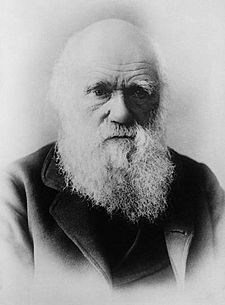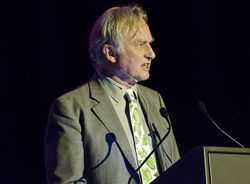Richard Dawkins, Darwin And Psychogenic Illness
 From Conservapedia
From Conservapedia 
A psychogenic illness is one that originates in the mind or in a mental condition. Psychosomatic disorders and mental illness that is not caused by an underlying physical condition are examples of psychogenic illnesses.
There is a considerable amount of scientific evidence that suggests that theism is more conducive to mental and physical health than atheism (See:Atheism and health).[3]
The medical literature and historical evidence suggests that the evolutionist and agnostic/atheist Charles Darwin suffered from psychogenic illness related to the controversies that surrounded his evolutionary ideas (see: Charles Darwin's illness). In addition, the historical evidence indicates that Darwin had both agnostic and atheistic sentiments (See also: Religious views of Charles Darwin).
According to the evolutionist, new atheist and agnostic Richard Dawkins: Dawkins' doctors advised him to avoid controversy; he suffers from chronic high blood pressure; Dawkins believes his recent stroke may have been stress related and may have been caused by a controversy with his fellow skeptics which caused him to be temporarily disinvited to a skeptics conference; and Dawkins' says he is not very good at avoiding controversies (see: Richard Dawkins' health).
Furthermore, Richard Dawkins has a reputation for being an angry and aggressive man (see: Richard Dawkins and anger and Abrasiveness of Richard Dawkins). Even Dawkins admitted, "Well, perhaps I'm angry."[4] His demeanor cost him large reduction in his amount of public influence (See: Richard Dawkins' loss of influence).
According to Glenn Gandelman, MD, "A recent study indicates that angry men have higher blood pressure and increased risk of heart disease.[5]
Contents
- 1 Charles Darwin, controversies, wavering unbelief and mentally caused illness
- 2 Richard Dawkins' public persona flip-flops between atheism and agnosticism
- 3 Cult of personalities and Charles Darwin and Richard Dawkins
- 4 Richard Dawkins, anger and stress/controversy induced illness
- 5 Richard Dawkins' thoughts on veganism
- 6 Richard Dawkins' stroke and Christians praying for his recovery
- 7 See also
- 8 Notes
Charles Darwin, controversies, wavering unbelief and mentally caused illness[edit]
See also: Charles Darwin's illness and Atheists doubting the validity of atheism
For most of his adult life Charles Darwin suffered from very poor health.[6] The 1992 New Encyclopedia Britannica stated that Darwin's illness was psychogenic in origin.[7] A 1997 article in the Journal of the American Medical Association declared concerning Darwin's illness that the "variable intensity of symptoms and chronic, prolonged course without physical deterioration also indicate that his illness was psychiatric." [8] In addition, a journal article in the American Journal of Medicine states that Darwin suffered from "psychoneurosis provoked and exaggerated by his evolutionary ideas".[9] The American Journal of Medicine article also stated that his Darwin's wife, Emma, greatly disapproved of his evolutionist ideas and "This, facsimile of public reaction, must have kept lively his anxiety and torment".[10]
According to medical journals Darwin suffered the following symptoms: palpitations, shortness of breathe ("air fatigues" ), light headedness ("head swimming" ), trembling, crying, dying sensations, abdominal distress, and depersonalization ("treading on air and vision"), nausea, severe vomiting, flatulence, alimentary canal pain, various forms of eruption of the skin, and nervous exhaustion.[11]
Late in Charles Darwin's life, Darwin told the Duke of Argyll that he frequently had overwhelming thoughts that the natural world was the result of design.[12] In a letter to Asa Gray, Darwin confided: "...I am quite conscious that my speculations run quite beyond the bounds of true science."[13]
Darwin once wrote to his physician 'We are a wretched family and ought to be exterminated.' [14] Given Darwin's likely psychomatic or psychobiological illness, various creationists have stated that Darwin's illness was the result of guilt and/or fear.[15][16]
Richard Dawkins' public persona flip-flops between atheism and agnosticism[edit]
Richard Dawkins' public persona flip-flops between agnosticism and atheism (see: Richard Dawkins and agnosticism).
Cult of personalities and Charles Darwin and Richard Dawkins[edit]
There is a cult of personality and type of religiosity currently surrounding Charles Darwin. Stephen Jay Gould wrote the following in 1978: ""... all theories [of natural selection] cite God in their support, and ... Darwin comes close to this status among evolutionary biologists ...".[17] In 2002, Michael White similarly wrote: "Of course today, for biologists, Darwin is second only to God, and for many he may rank still higher."[18]
Despite recently having a large loss of public influence (see: Richard Dawkins' loss of influence), Richard Dawkins also has a cult of personality which follows him (see: Richard Dawkins' cult of personality).

On August 16, 2014, Andrew Brown wrote an article for The Spectator entitled The bizarre – and costly – cult of Richard Dawkins which declared:
| “ | ...the Richard Dawkins website offers followers the chance to join the ‘Reason Circle’, which, like Dante’s Hell, is arranged in concentric circles. For $85 a month, you get discounts on his merchandise, and the chance to meet ‘Richard Dawkins Foundation for Reason and Science personalities’. Obviously that’s not enough to meet the man himself. For that you pay $210 a month — or $5,000 a year — for the chance to attend an event where he will speak...
But the $85 a month just touches the hem of rationality. After the neophyte passes through the successively more expensive ‘Darwin Circle’ and then the ‘Evolution Circle’, he attains the innermost circle, where for $100,000 a year or more he gets to have a private breakfast or lunch with Richard Dawkins, and a reserved table at an invitation-only circle event with ‘Richard’ as well as ‘all the benefits listed above’, so he still gets a discount on his Richard Dawkins T-shirt saying ‘Religion — together we can find a cure.’ The website suggests that donations of up to $500,000 a year will be accepted for the privilege of eating with him once a year: at this level of contribution you become a member of something called ‘The Magic of Reality Circle’. I don’t think any irony is intended. At this point it is obvious to everyone except the participants that what we have here is a religion without the good bits.[19] |
” |
Dawkins is an extremely avid admirer of Charles Darwin[edit]
Dawkins is an extremely avid admirer of Charles Darwin and believes that Darwin was a genius who "had a big idea, arguably the most powerful idea ever."[20][21]
Richard Dawkins, anger and stress/controversy induced illness[edit]

See also: Richard Dawkins' health and Richard Dawkins and medical science
As noted above, Richard Dawkins has a reputation for being an angry and aggressive man (see: Richard Dawkins and anger and Abrasiveness of Richard Dawkins).
Additionally, as mentioned above, according to Glenn Gandelman, MD, "A recent study indicates that angry men have higher blood pressure and increased risk of heart disease.[24] PubMed has numerous studies relating to anger and high blood pressure.[25][26]
As indicated previously, according to Richard Dawkins: Dawkins' doctors advised him to avoid controversy; he suffers from chronic high blood pressure; Dawkins believes his recent stroke may have been stress related and may have been caused by a controversy with his fellow skeptics which caused him to be temporarily disinvited to a skeptics conference; and Dawkins' says he is not very good at avoiding controversies (see: Richard Dawkins' health).
Atheist Hemant Mehta reported about Dawkins' stroke and Dawkins' report that he had been once again invited to the conference:
| “ | It was the result of stress-related higher blood pressure, which he says he may have had as a result of recent controversy, including being booted from the NECSS conference. He added, however, that on February 5, he received a letter from conference organizers apologizing for disinviting him and asking him back to the conference.[27] | ” |
The Religion New Service reported about Dawkins: "He said doctors 'keep advising me not to get involved in controversies and I am afraid I had to tell them that controversy — that not getting into controversies — is one of the things I am not particularly talented at.'"[28]
Despite the medical advice of his doctors, Dawkins had a very active Twitter presence before his minor stroke (with a number of Twitter controversies) and numerous public controversies.[29]
Dawkins has accumulated over 30,000 Twitter tweets.[30] The Independent reported, "Dawkins also admitted he wasn't very good at managing Twitter and the strong reactions his posts tend to provoke. 'Twitter is very difficult medium to handle,' he said. 'I’m not much of a diplomat.'"[31] However, after his stroke, in May 2016, Dawkins gave up posting on Twitter for awhile and the tweets that appeared in his name were done by his staff.[32]
In December of 2016, Dawkins appears to have started to Tweet again despite his doctors warnings to avoid controversy (For example, he tweeted that Britain had become a "nasty little backwater" after the Brexit vote and his Tweet drew fierce criticism).[33][34][35]
In short, Dawkins repeatedly ignored the medical advice of his doctors.[36] [37][38]
In 2013, Martin Robbins wrote in the New Statesman concerning the public persona of Dawkins: "Increasingly though, his public output resembles that of a man desperately grasping for attention and relevance..."[39]
The National reported concerning the agnostic and evolutionist Richard Dawkins:
| “ | There was a time when the British scientist Richard Dawkins was widely admired...
More recently, he has shifted his attention to religion and has become known as one of its fiercest opponents. His insistence on allowing for none of the shade and subtlety that characterise the works of scholars such as Karen Armstrong, author of acclaimed books on Islam and the history of the monotheistic religions, have offended and infuriated millions. But they also have thrilled his followers who wish all discussion of faith to be banished to the fringes of the public square. Mr Dawkins has always been pugnacious. When I interviewed the philosopher Daniel Dennett, a professor at Tufts University and a fellow leading member of an atheist group that calls itself the Brights, he described himself as being the “good cop” to Mr Dawkins’s “bad cop”. Mr Dennett conceded: “Richard is so hostile and aggressive that he’s unsympathetic.” But now, Mr Dawkins’s unwillingness to treat anyone who disagrees with him as though they had even half a functioning brain cell is putting off even his own supporters. “Richard Dawkins, whatever happened to you?” read a recent headline in The Guardian, the British newspaper whose readers and staff are generally among the most sympathetic to him. What does it say when a home to some of the most ardent atheists wants Richard Dawkins, frankly, to put a sock in it?[40] |
” |
Christianity Today indicated about Richard Dawkins:
| “ | Some atheists have sought to distance themselves from Dawkins because they feel the combative way in which he argues against faith is doing more harm than good for the atheist cause.
Dawkins appears to care little about what others think about his approach, atheist or otherwise, as after all these years he's still gunning for the religious. In his own eyes at least, "aggressive" would be too strong a term for his stinging attacks on faith. "I'm not aggressive!" Dawkins exclaimed in last week's appearance at the College of Liberal Arts and Sciences (University of Connecticut), when Dean Jeremy Teitelbaum asked him why he had come to take "quite an aggressive stand against God and promote atheism". On second thoughts, "Well, perhaps I'm angry," he admitted, before dropping the pretences altogether and making clear what he thinks about anyone who teaches children anything other than his beliefs on evolution.[41] |
” |
Richard Dawkins' thoughts on veganism[edit]
Richard Dawkins' stroke and Christians praying for his recovery[edit]
- Richard Dawkins' stroke prompts Twitter debate on praying for him, Christianity Today
- Atheist Richard Dawkins Stroke Has Christians Praying For Health, Update: Death Unlikely, Inquisitor, 2016
- The Church of England is absolutely right to pray for Richard Dawkins by Peter Ormerod, The Guardian
- Church of England: Our Prayers for Richard Dawkins Are Sincere, Not 'Trolling', Christian Post, 2016
Richard Dawkins' website on faith healing. Bible believing Christianity and prayer experiment[edit]
See also: Studies on prayer and Argument from religious experience
Dawkins' website published an article against faith healing on his website written by the atheist Jerry Coyne.[42]
Bible believing Christianity and prayer experiment[edit]
The Christian Post reporter Stoyan Zaimov wrote:
| “ | Double-blind prayer experiments: where people pray for others with terminal illness. Habermas admitted that most such experiments have not worked, but the three that he knows of that have indeed worked were cases of orthodox-Christians praying for the sick.[43] | ” |
Gary Habermas has also discussed documentations of miracle claims and referred to thousands of cases around the world of documented miracles, including those where medical doctors witness prayer healing people with severe physical disabilities.[44]
See also[edit]
Notes[edit]
- ↑ http://plato.stanford.edu/entries/teleological-arguments/notes.html
- ↑ http://www.darwinproject.ac.uk/entry-2109
- ↑ Multiple references:
- Mueller, Dr. Paul S. et al. (December 2001). "Religious involvement, spirituality, and medicine: implications for clinical practice". Mayo Clinic Proceedings vol. 76:12, pp. 1225-1235. Retrieved from Mayo Clinic Proceedings website on July 20, 2014.
- "Research library". Duke University Center for Spirituality, Theology and Health. Retrieved on July 24, 2014.
- McCullough, Michael E. et al. (2000). "Religious involvement and mortality: a meta-analytic review". Health Psychology. vol. 19:3. pp. 211-222. Retrieved from University of Miami, College of Arts and Sciences, Department of Psychology website on July 24, 2014.
- Casey, Professor Patricia (April 3, 2009). "The psycho-social benefits of religious practise" [executive summary]. Iona Institute for Religion and Society [Ireland] website. Retrieved on July 24, 2014.
- McCullough, Michael E. and Willoughby, Brian L. B. (2009). "Religion, self-regulation, and self-control: associations, explanations, and implications". Psychological Bulletin, vol. 135: 1, pp. 69–93. Retrieved from University of Miami, College of Arts and Sciences, Department of Psychology website on July 24, 2014.
- University of Colorado at Boulder (May 17, 1999). "Research shows religion plays a major role in health, longevity". ScienceDaily. Retrieved on July 24, 2014.
- Dervic, Kanita, et al. (December 2004). "Religious affiliation and suicide attempt" [abstract]. The American Journal of Psychiatry, vol. 161:12, pp. 2303-8. Abstract retrieved from National Institutes of Health, U.S. National Library of Medicine, National Center for Biotechnology Information, Pub Med on July 24, 2014.
- University of Warwick (December 2003). "Psychology researcher [Dr. Stephen Joseph] says spiritual meaning of Christmas brings more happiness than materialism". Scienceblog. Retrieved on July 24, 2014.
- ↑ Richard Dawkins: I'm not aggressive about God...perhaps just angry
- ↑ Anger, Stress and High Blood Pressure, Glenn Gandelman, MD, MPH
- ↑ http://www.answersingenesis.org/creation/v17/i4/darwins_illness.asp
- ↑ http://www.answersingenesis.org/creation/v17/i4/darwins_illness.asp
- ↑ Charles Darwin and Panic Disorder" by Thomas J. Barloon, MD and Russel Noyes, Jr., January 8, 1997 Journal of the American Medical Association
- ↑ "The Illness of Charles Darwin", William B. Bean, September 1978, American Journal of Medicine
- ↑ "The Illness of Charles Darwin", William B. Bean, September 1978, American Journal of Medicine
- ↑ "The Illness of Charles Darwin", William B. Bean, September 1978, American Journal of Medicine and "Charles Darwin and Panic Disorder" by Thomas J. Barloon, MD and Russel Noyes, Jr., January 8, 1997 Journal of the American Medical Association
- ↑ http://plato.stanford.edu/entries/teleological-arguments/notes.html
- ↑ http://www.darwinproject.ac.uk/entry-2109
- ↑ The descent of man Mail Online, February 23, 2009
- ↑ http://www.answersingenesis.org/creation/v17/i4/darwins_illness.asp
- ↑ http://www.pathlights.com/ce_encyclopedia/Encyclopedia/20hist06.htm
- ↑ http://www.bradburyac.mistral.co.uk/dar1.html
- ↑ http://www.bradburyac.mistral.co.uk/dar1.html
- ↑ The bizarre – and costly – cult of Richard Dawkins, The Spectator, Andrew Brown 16 August 2014
- ↑ Why Darwin matters by Richard Dawkins, The Guardian
- ↑ The three-part television documentary The Genius of Charles Darwin was written and presented by Richard Dawkins
- ↑ Dawkins: Mock them. Ridicule them! In public
- ↑ Dawkins: Mock them. Ridicule them! In public
- ↑ Anger, Stress and High Blood Pressure, Glenn Gandelman, MD, MPH
- ↑ PubMed - Anger and hypertension
- ↑ PubMed: Anger and high blood pressure
- ↑ Richard Dawkins Gives Update on His Health in Audio Message
- ↑ Richard Dawkins says stroke caused by stress over controversy, Religion New Service
- ↑
- Richard Dawkins says stroke caused by stress over controversy, Religion New Service
- The 12-Stage 'Evolution' Of A Richard Dawkins Twitter Scandal by Paul Vale, The Huffington Post UK, Posted: 22/08/2014 02:06 BST
- Richard Dawkins, delete your account: The prominent atheist implodes on Twitter (again), Salon
- 15 Of Richard Dawkins' Most Controversial Tweets, Huffington Post
- ↑ Richard Dawkins Twitter
- ↑ Richard Dawkins defends Ahmed Mohamed comments and dismisses Islamophobia as a 'non-word'
- ↑ Dawkins: I’ve Given Up Twitter.
- ↑ Richard Dawkins: England becoming a 'nasty little backwater' after Brexit vote, The Telegraph, March 2017
- ↑ SHOCK RANT: Richard Dawkins mocks Christians for 'pretending' there's WAR on Christianity, Express, December of 2016
- ↑ What British Scientist Dawkins Thinks Of Islam, Swaraya, June 7, 2017
- ↑ An update on Richard’s condition in his own words, Richarddawkins.net
- ↑ Richard Dawkins Said He Was Stressed by Controversy Over Tweet Before Stroke, Christian Post, February, 2016
- ↑ Richard Dawkins says stroke caused by stress over controversy, Religion New Service
- ↑ Atheism is maturing, and it will leave Richard Dawkins behind
- ↑ Richard Dawkins has gone so far, he’s lost even his atheist friends, The National
- ↑ Richard Dawkins: I'm not aggressive about God...perhaps just angry
- ↑ [Faith Healing Kills Children] by Jerry Coyne
- ↑ Christian Apologist: 10 Reasons for the Fall of Atheism by Stoyan Zaimov, Christian Post, October 14, 2013
- ↑ Christian Apologist: 10 Reasons for the Fall of Atheism By Stoyan Zaimov, Christian Post Reporter
Categories: [Richard Dawkins]
↧ Download as ZWI file | Last modified: 02/16/2023 10:25:00 | 112 views
☰ Source: https://www.conservapedia.com/Richard_Dawkins,_Darwin_and_psychogenic_illness | License: CC BY-SA 3.0
 ZWI signed:
ZWI signed:

 KSF
KSF